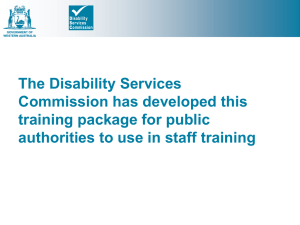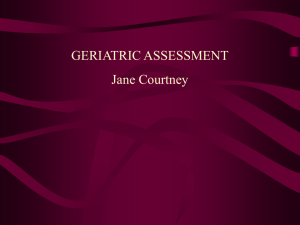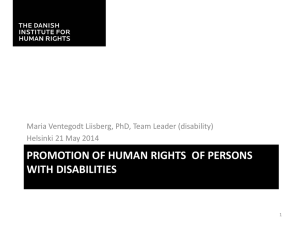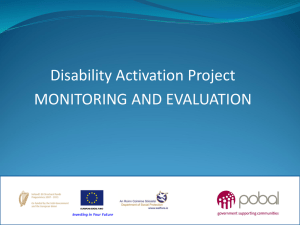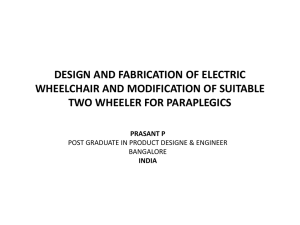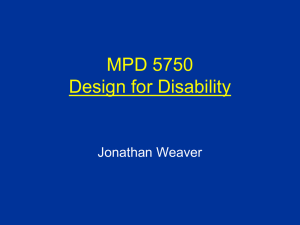Disability Etiquette
advertisement
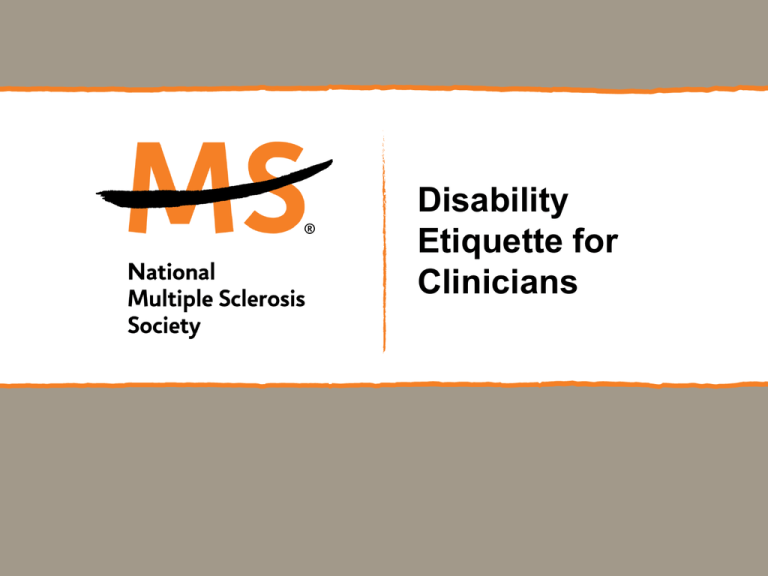
Disability Etiquette for Clinicians Disability Language and Etiquette What we say and how we say it can either enhance the dignity of those we serve, or inadvertently reflect and perpetuate stereotypes and negative attitudes And how we think affects how we talk and behave The Power of Words • • • • • Disability language and etiquette are about respect, common sense, and common courtesy. Some common words and phrases reinforce prejudices and assumptions. The right language challenges discrimination and stereotypes. Language is continually evolving: not everyone agrees on what is appropriate and what is not. Sincerity and honesty go a long way. Important Concepts to Remember • The person always comes before the disability. A person who has…MS…a disability…. • Disability and handicap are not synonymous. • Disability is a normal part of life—most people who live long enough will experience disability. Most of us are “temporarily able-bodied” • People with disabilities—even MS—are not a homogeneous group. Stereotypes to Avoid People living with disabilities are “courageous.” People’s lives are ruined by disease or disability. Disability (MS) dominates a person’s life. Disease or disability was caused by something the person did or did not do. • People with disabilities aren’t as smart (capable, interesting, diverse) as other people. • People with disabilities are sick. • • • • General Language • Phrases to avoid: • Use instead: wheelchair bound, confined to a wheelchair Uses a wheelchair, Sufferer, afflicted, victim, invalid, crippled, stricken Person with a disability Handicapped/ disabled parking Accessible parking Normal person, healthy person Person without disability, able-bodied person MS-Specific Language • Phrases to avoid: • Say instead: MS person/patient/client Person with MS/who has MS MSers People with MS Person suffering from/afflicted with MS Person living with/affected by MS When she was stricken with MS When she was diagnosed with MS Those Who Care • Family member…significant other…caregiver… carepartner—what to say, and when? • Caretakers are for cemeteries and property— never people. • People who are paid to provide care are usually called “personal assistants.” Etiquette in Conversation • First and foremost: relax and enjoy the uniqueness of the individual. • Treat the person as you would any other. • Speak directly to the person—not through a companion! • Don’t make assumptions about what a person can or cannot do based on what you see and what you [think you] know. • Remember that disability is not always visible— and neither is ability. More Tips for Conversation Etiquette • Offer help if it seems appropriate—and then wait for a response. • Don’t lean on a person’s wheelchair. • Step back or pull up a chair to have a conversation with someone who is seated in a wheelchair. • Don’t pat or talk to a helper dog unless invited to do so. • Don’t worry about using normal phrases (take a walk…run an errand…see you later). What if…? • …I can’t understand a person’s speech? • …I offer my hand to someone and then realize she can’t move hers? • …a person is wheeling his own chair and looks fatigued? • …it is taking a really long time for a person to finish a thought? • …I’m sitting next to someone who can’t manage the food on her plate? • …after I’ve answered a person’s question, he looks blank or confused.

